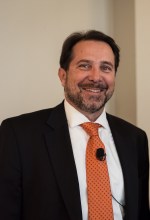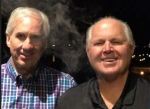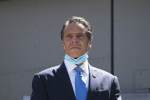Hello, it’s Monday, Dec. 14, 2020. Sometime today, according to John Hopkins University (the source I’ve been using during the coronavirus pandemic), the United States will pass a grim milestone: 300,000 Americans will have died from COVID-19 or associated complications from the disease. Globally, the total exceeds 1.6 million. No country has been spared: from China, where it started, to tiny Norway, which was quick (at least among Western democracies) to lock down and which seems to have weathered the scourge better than its neighbors.
Norway is on my mind for another reason this morning: On this date in 1911, Norwegian explorer Roald Amundsen became the first person to reach the South Pole. I generally write about U.S. history in this space. But Roald Amundsen’s feat, which I first wrote about five years ago, was directly inspired by two American explorers. In addition, his can-do spirit is precisely the kind of determination we admire in the United States, and which we badly need to rekindle.
I’ll have more on this idea in a moment. First, I’d direct you to RealClearPolitics’ front page where we aggregate polls, videos, and news stories — as well as commentary spanning the political spectrum. We also offer an array of original material from our own reporters and contributors, including the following:
* * *
Will Biden Limit Himself to One Term? Ron Faucheux suggests the president-elect would have a stronger hand in the coming four years if he’d rule out a second term.
What Trump Should Say Now. Mark Weinberg has this advice for the president’s speechwriters.
Georgia Is Not Prosecuting Double Voters. Paul Sperry has the details at RealClearInvestigations.
Hunter Biden News Should Shame Dismissive Media Outlets. Mark Hemingway argues that apologies are in order from media outlets that failed to pursue allegations first reported by the New York Sun.
RCP Takeaway Podcast. In the latest edition, Andy Walworth, Tom Bevan, Jim Glassman and I discuss the Hunter Biden story, and whether Joe Biden’s fortunes would be helped or hindered by Democratic wins in the Georgia Senate runoffs.
Donald the Dragon Slayer. Frank Miele writes that the 45th president will be most remembered for his willingness to fight mano a mano with a mainstream media largely arrayed against him.
If Biden Wants to Help Middle America, He’ll Lift Tariffs. The trade war with China, atop the pandemic, is hurting the working class, Savannah Shoemake contends.
Will Biden Heed Support Shown for Accused Students’ Rights? Stuart Taylor Jr. cites polling data indicating that most Americans support protections mandated by the Betsy DeVos Education Department.
HHS Nominee Becerra Has Downplayed Abortion Pill Risks. Kristan Hawkins spotlights the California AG’s efforts to reduce safeguards for women undergoing chemical abortions.
Biden Adviser’s Disregard for the Dignity of Aging. At RealClearReligion, Mary Vought revisits Zeke Emanuel’s 2019 article in the Atlantic titled “Why I Hope to Die at 75.”
Are Liberals Really Less Tolerant Than Conservatives? At RealClearEducation, Jeffrey Sachs takes exception to the methodology used to compile the 2020 College Free Speech Rankings, which he says skews the results.
* * *
Born into a family of merchant sea captains, Roald Amundsen liked to call himself “the last of the Vikings.” It was a fitting description. As a skipper, Amundsen was taciturn, physically imposing, firm with his crew, and single-minded in his pursuits. His men simply called him “chief.”
His original idea was to be the first explorer to reach the North Pole, but two Americans beat him to the punch — or, at least, claimed they did. On Sept. 7, 1909, the New York Times treated its readers to sensational news, courtesy of an explorer named Robert E. Peary: “Peary Discovers the North Pole After Eight Trials in 23 Years.”
This was exciting for two reasons: First, the North Pole was one of the last “undiscovered” places on the globe and getting there supposedly signified the end of the long era of Earth-bound exploration. The second reason is that only one week earlier, a rival newspaper, the New York Herald, announced that another American explorer — Peary’s former friend and shipmate Frederick A. Cook — had discovered the North Pole.
Whichever American got there first (and recent scholarship suggests that if either man did, it was Cook), the news hit Roald Amundsen hard. That was his own dream, one he’d used to secure funding for his expedition and a borrowed ship to make it happen. But Amundsen wasn’t the type to sit around and mope. He simply changed his destination from the Arctic to the Antarctic, without so much as telling his crew or his sponsors and headed south instead of north.
He found himself in a three-year race with an Englishman named Ernest Shackleton, who ended up abandoning his quest about 100 miles short of the South Pole. Another British explorer, Robert Scott, didn’t turn back in time. Scott made two fatal mistakes. He had procured Siberian ponies instead of sled dogs for the last portion of the journey, and he started off three weeks after Amundsen. In those three weeks the weather turned brutal. On Jan. 25, 1912, some six weeks after Amundsen’s team raised the flag of Norway at the pole, Scott’s party reached the South Pole. But as they headed back out, they encountered ferocious blizzards. “Our luck in weather is preposterous,” Scott wrote in a diary that was found many months later, along with his body and those of his men. They died in their tent in March only 11 miles from a cache of food and fuel they had left on the way in.
Although he was hailed in the United States (but not in Britain and only grudgingly in Norway), Amundsen seemed to have been deeply disturbed by their deaths. He was also haunted by the landscape he had seen. He resumed his explorations, this time in the icy northern landscape of his original quest. “If you only knew how splendid it is up there,” he told a journalist, adding, “That’s where I want to die.” This prophecy came true in 1928. While on an airborne rescue mission, his plane crashed into the Arctic Ocean.
Are such lives wasted? I think not. Those who push the envelope in search of the unknown teach us much about our world, and ourselves. With most of the world mapped and chronicled by the mid-20th century, the innate desire to explore had turned humans’ attention to the heavens. There was danger there, too, and lessons to be learned, and relearned. Some of them were the same as in the most inhospitable corners of Earth — and have universal application.
Roald Amundsen’s observations about a cold and uninhabited world would be experienced by astronauts as well. They also have a general application to those in the 21st century living on a warming and crowded planet. “Everything is on a reduced scale here in the Polar regions,” he wrote. “We can’t afford to be extravagant.”
Carl M. Cannon
Washington Bureau chief, RealClearPolitics
@CarlCannon (Twitter)
[email protected]






